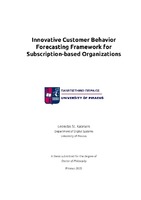Innovative customer behavior forecasting framework for subscription-based organizations
Καινοτόμο πλαίσιο πρόβλεψης συμπεριφοράς πελατών συνδρομητικών οργανισμών

Doctoral Thesis
Author
Κατελάρης, Λεωνίδας
Katelaris, Leonidas
Date
2020Advisor
Θεμιστοκλέους, ΜαρίνοςView/
Keywords
Customer behavior forecasting ; Customer churn ; Customer churn framework ; Information systems ; Machine learningAbstract
This thesis focuses on customer behavior forecasting and more specifically the customer churn faced by subscription-based organizations. Customer churn is a critical and challenging issue for subscription-based organizations in a rapidly
growing and competitive market. Customer churn is inextricably linked with organizations prosperity and growth, as it is responsible for revenue and sales losses and potential negative impact to organizations due to the loss of customers.
Accordingly, many organizations from the subscription-based domain conduct research resulting in the development and assessment of various methods, techniques, and solutions, that could improve churn prediction. However, there is a lack of customer churn prediction framework and a commonly accepted churn prediction procedure, that will support decision making process. Taking into account the above, this thesis focuses on: i) the proposition of a churn prediction procedure and ii) the synthesis and development of a customer churn prediction framework that can be used as a decision making tool, and may assists organizations in churn reduction. Grounded, on the systematic literature review conducted in Chapter 2, a research
gap was identified. In an attempt, to address this gap a churn prediction procedure and a customer churn prediction framework were conceptualized and proposed in Chapter 3. The proposed conceptualization, was tested in the practical arena using an interpretivism qualitative multiple case study strategy. Empirical data collected from two telecommunication subscription-based organizations, verified the proposed conceptualization and suggested minor additions. The latter, resulted in the revised customer churn prediction framework presented in Chapter 6. The research work carried in this thesis, contributes to
the body of knowledge, by providing novel contribution and extending the literature. It also assist organizations to customer churn prediction accuracy and supports decision making process.


